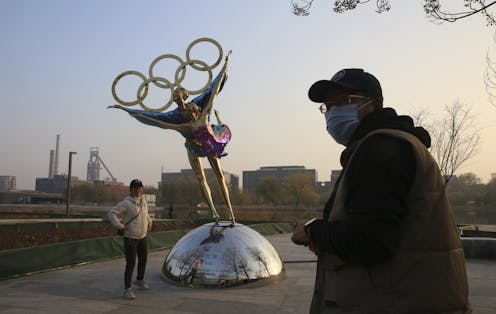Why Australia's diplomatic boycott of the Beijing Winter Olympics is important, but unlikely to have any significant impact
- Written by Richard Baka, Adjunct Fellow, Olympic Scholar and Co-Director of the Olympic Research Network, Institute for Health and Sport, Victoria University

Prime Minister Scott Morrison has announced a diplomatic boycott of the Beijing Winter Olympics in Beijing in February. This means that while athletes will still compete in the games, no officials will represent Australia at the event.
The move follows the United States’ announcement[1] earlier this week of a diplomatic boycott. New Zealand has also said it will not send officials to the winter games, and other countries are expected to follow suit[2].
Morrison said the Australian boycott was due to China’s treatment[3] of the mostly-Muslim Uighurs in the far western province of Xinjiang. In explaining the decision, he said
people have been very aware that we have been raising a number of issues that have not been received well in China, and there’s been a disagreement between us on those matters.
Read more: Australia will follow US in diplomatic boycott of China's Winter Olympics[4]
What is the purpose of a diplomatic boycott?
A “diplomatic boycott” is a new phenomenon - even the term itself appears to be a new invention. Traditionally, when it comes to the Olympic Games, countries either opted for a full boycott – which meant they did not attend in any capacity – or they participated.
So a diplomatic boycott appears to offer those countries engaging in it the best of both worlds: they still allow their athletes to compete (a full boycott would likely be very poorly received in their home countries), but they also register their dissatisfaction with China’s human rights record in the process.
It is something of a slap in the face to China, and the initial reaction from Beijing[5] has been hostile, referring to the US’s stance as “posturing” and arguing the country hadn’t been invited in the first place.
The Olympics movement has long had difficulty managing China’s human rights record alongside the country’s hosting of games. China lost the bid for the 2000 games to Sydney in a close vote largely because of its human rights record[6], but it won the 2008 summer games on the promise it would improve.
In hindsight, the International Olympic Committee (IOC) should have pushed the issue harder. But they wanted to stay allied with China, and chose not to.
So is a diplomatic boycott even worthwhile?
Some officials, including the IOC’s Dick Pound, believe it will achieve little[7], and I tend to agree. But it’s a face-saving measure for everybody – a way of expressing discontent without actually withdrawing from the competition, and punishing the athletes in the process.
Usually, Olympics are not particularly significant diplomatic occasions in any event - they are more like a big party than a major international meeting. While officials are usually wined and dined by the host country, COVID restrictions mean that will not be happening in Beijing in 2022 to the usual extent, so officials are not missing much, and Morrison is probably saving Australian taxpayers some money.
Read more: As the Beijing Winter Olympics countdown begins, calls to boycott the 'Genocide Games' grow[8]
Previous Australian diplomatic boycotts
Threats or talk of Olympics boycotts have long been louder than actual boycotts - once a live option at the height of the Cold War, they are no longer in fashion.
Australia’s most notable dalliance with an Olympic boycott was at the Moscow games in 1980. President Jimmy Carter announced the US would boycott the summer games[9] in response to the Soviet Union’s 1979 invasion of Afghanistan.
Australian Prime Minister Malcolm Fraser wanted to follow suit, but the Australian Olympic Committee – which operates independently of government – decided Australia would still compete. In response, Fraser withdrew funding from the AOC.
A few Australian athletes decided not to go to the games, and those who did marched under the Olympic flag in the opening ceremony[10] instead of the Australian flag.
But years later, Fraser conceded[11] an attempted boycott was the wrong move, saying it was a “divisive” idea that had a terrible affect on the athletes.
The US-Soviet Union tit-for-tat boycotts endured for some years. The Russians didn’t go to the Los Angeles games in 1984. But since then, boycotts have fallen out of fashion, in acknowledgement, perhaps, that they achieve little and punish only the athletes.
Will the athletes be affected by the diplomatic boycott?
It is very unlikely there will be any repercussions for athletes in all of this. The Chinese will be happy the athletes are competing, and while the politicians will express their discontent with each other, it’s unlikely to have any real impact on competitors.
That is, of course, unless there are noticeable protests by the athletes themselves at the games. The IOC recently changed its policy[12] to allow mild protest at the games - but not during events or awards ceremonies. If this happened, Chinese officials, the IOC or national Olympic committees would likely take action.
Read more: The Olympics have always been a platform for protest. Banning hand gestures and kneeling ignores their history[13]
References
- ^ announcement (edition.cnn.com)
- ^ expected to follow suit (www.nytimes.com)
- ^ China’s treatment (www.bbc.co.uk)
- ^ Australia will follow US in diplomatic boycott of China's Winter Olympics (theconversation.com)
- ^ initial reaction from Beijing (www.theguardian.com)
- ^ largely because of its human rights record (www.nytimes.com)
- ^ believe it will achieve little (www.politico.com)
- ^ As the Beijing Winter Olympics countdown begins, calls to boycott the 'Genocide Games' grow (theconversation.com)
- ^ announced the US would boycott the summer games (2001-2009.state.gov)
- ^ Olympic flag in the opening ceremony (en.wikipedia.org)
- ^ Fraser conceded (www.theage.com.au)
- ^ changed its policy (www.nytimes.com)
- ^ The Olympics have always been a platform for protest. Banning hand gestures and kneeling ignores their history (theconversation.com)

















